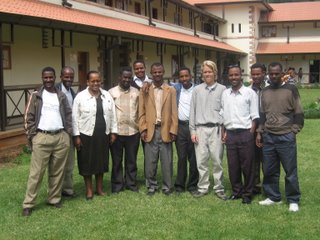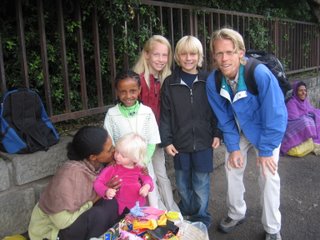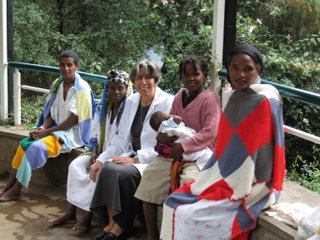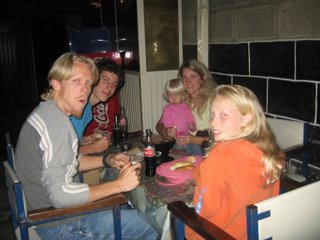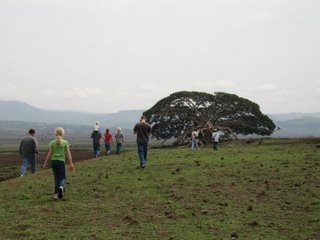Today you get Nancy’s point of view. Yes, I’m a woman who speaks in details and this will be long, so I’ve tried to break it up in sections so you don’t have to read it all if you don’t want to. There’s just so much! Also we have found that internet access is not as good as we thought. We have limited access to dial-up connections so that is why we haven’t written many personal emails or are able to add pictures like we thought. We’ll have lots to show you when we get back!
Luggage: We did get our luggage on Monday night (all 24 pieces our team had checked). Yeah, clean clothes. Thank you Lord! (Ixibir amestedginarlo!)
Jetlag: The kids and I are doing great! I am so glad we are here. I can’t wait to show you pictures, those of you who are picture people. There is really no way to put in words all that we have seen. The kids have adjusted well to the time change and didn’t suffer at all from jetlag. Kelsey is even on her 2 nap a day schedule. I’m still not sleeping through the night. My body thinks I’m still in NC. We are 7 hours ahead of you guys in NC. We’ve been told it takes one day per time zone to get acclimated.
Our apartment: We were blessed when we arrived to find that they had put our family in an apartment at the Guest House. We thought we were going to have two adjoining dorm style rooms with a shared bathroom on the hall. Instead we have a living room, kitchen/dining room and one bedroom. Garren is sleeping on a mattress on the floor in the kitchen/dining room and the rest of us are in the bedroom. They even had a pack-n-play ready for Kelsey so she is right at home. This is great because we can prepare some of our own meals when we don’t want what they are serving in the dining room. Downstairs there is also a really nice lounge/living room area, a large dining hall, a playroom with toys and books for the kids and a TV room...satellite TV and videos. Geoffrey is excited because he will get to see the Tour d’France. He thought he would miss it this year and as you know he is a big cyclists fan!
Food: The food here is so good. We came prepared to have to eat lots of different foods but that has not really been the case. The food they serve in the dining hall is very American. Dad, you would even like it! Most of the restaurants we have gone out to are also very Western and the food is great! It may have a little different twist but still very good. Since the Italians occupied Ethiopia for a few years there are lots of pasta dishes on the menus so Garren is very happy. He loves Fettuccini Alfredo! I came here thinking maybe I would lose weight but with all the yummy food that’s not going to happen. Every day at 10:30 they have tea time in the dining hall where they serve hot tea and cake. Kara and Garren have grown to really love the hot tea (with lots of sugar) and can’t wait for tea time each day. Friday night we had a real treat. We went out to dinner at a real Ethiopian restaurant with real Ethiopian food, decor, music and dancing. We ate Injera b’wat. We’ll explain later if you want details. The food was very good, all eaten with our fingers. The music and dancing was incredible. They performed dances from different regions of the country and wore costumes to go with the dance and the region.
Language: We are trying to learn what we can so we can communicate a little when we are out. I think for only being here one week we are doing great. We know our greetings...hello, how are you and how to respond, our numbers 1-10 and by 10s to 100, words for things we want to order coffee, tea and bananas (Kelsey’s favorite), and so on. It is hard not to be able to communicate the way we would like and very intimidating. Thankfully most people speak some English. Ask us for words when we get back!
The city: The compound (this is the gated in area where our apartment is located) is right in the city, Addis Ababa. Its very different from the States because there are people EVERYWHERE! I have never seen so many people on the streets. The unemployment rate here is somewhere around 50-60% so the people just don’t have anywhere to go. They walk the streets. The diversity you see is unbelievable. When you walk down the street you will beggars, women with little hungry children, crippled, someone with a box turned upside down and items on it to sell such as the tissue packs and hair ponytail holders, to men and women dressed nicely and even some in expensive business clothes. Its amazing how they are all mixed together.
The Ethiopian people: Even though we are the foreigners (ferenji) and really stand out we have not had any trouble. The people here are so friendly and hospitable. I have never been around a group of welcoming people as we have seen here. The hardest part is the beggars and lame we see as we walk in the city. This has really affected Kara. Her heart really hurts for these people and she will not walk without holding my hand. That’s ok though. I’m glad she has a tender heart and love for people. It is getting easier but I don’t know how you could ever grow accustomed to it.
Transportation: Most people walk, but when you need to get somewhere not in walking distance you have your choice of three different kinds of taxis...weeits (trucks with camper tops and seats on each side of the bed that face each other), mini-bus (your somewhat basic minivan with a few more seats. It costs .60 birr for a trip which is about .48 American cents. This is the basic way we travel) and a regular taxi (you bargain the price before you get in). These taxis are everywhere and definitely an experience to ride in!
People we have met here: It has been so amazing to meet the other families (from the States, Canada, New Zealand, Australia, Germany) staying here at the Guest House and hear their stories of where they have been and where they are going. We had Bible study Monday night with the other short term missionaries who are staying here. It was so great to study God’s Word with people from around the world. God is hard at work in Ethiopia. Also, I have had the chance to see Sarah Bell. The church where I grew up in Charlotte has supported the Bells for years. It so nice to get to see her and where she lives and works. We went to lunch and she showed us around the city a little. We are planning to go shopping next week and to their house for dinner one night. Its fun to come this far and know someone.
The Daborah House: This is a house that holds 32 girls, ranging in age from 8-18. They each once lived on the streets as beggars, homeless and even some in prostitution. They now live in this house run by SIM and go to school and work and have a hope and a future. We had the awesome privilege of going to this house to visit the girls. It was incredible. They are all so loving and welcomed us with open arms. They couldn’t wait to show us around and talk with us and show us their photo albums. The house where they live has only 5 rooms...3 bedrooms with bunkbeds where they sleep 2 per bed, a living/dining hall with picnic tables and a room with lockers for their books and clothes. They each have a 2' by 3' locked to put ALL their belongings. But this is home and so much better than the streets. Kara made friends right away with two girls her age and went off to talk. They had her read to them...a story book and a Bible. She loved it and can’t wait to go back. Garren was surrounded by girls who wanted to talk to him. He was a little overwhelmed and later said it was like being at one of Kara’s sleepovers. Most of the girls speak some English. Kelsey (whose name we found out means ‘sock’ in the language, Amheric, here!) was the star. They all loved to hold her and kiss her. She did amazingly well and was a little trooper. It was late so when we walked back into our apartment she said ‘night-night’ and headed straight for her bed. Geoffrey and I loved being with the girls and felt we were at a youth meeting. After we talked for a while then the girls sang for us and some shared their testimony. You wouldn’t believe what they have been through at such a young age. A few of girls have come to visit us since that night. The missionary that usually goes there on Tuesday nights to have Bible study with the girls will be gone this week so Geoffrey, Kara and I are going in her place. Say a prayer for us!
Chaltu: The couple who are our team leaders lived here in Ethiopia for 19 years. Chaltu was their house helper and also helped raise their children. She is probably in her 60s. They took the kids and I with them to visit her. Wow! She rents a room in a house for her and her 30+ year old daughter. Their home is probably 7' by 10' and its only one room. The house is made of mud as most are here. Her walls were covered some with photographs, Christmas wrapping paper and magazine pages. The rest was mud. She had one bed, a little table, a cabinet for their belongings and one bare lightbulb that hung from the ceiling. But it was a very joyful home. Chaltu knows the Lord and finds her joy there. (I wonder if we would still know the joy of the Lord if all our stuff was reduced to this?) She served us tea and bread and we had a nice time together. I couldn’t understand the conversation (just a few words here and there) but I could feel God’s love in that one room house! What a special lady!
Upcoming events for the me and the kids: We are going to visit the Fistula Hospital (you made have seen this on Oprah a year or so ago. I did and thought wow I’d love to go there, never dreaming then that I would be here and would actually be able to go). We also plan to help out with VBS at the International Church. We just take each day as it goes to see where we can minister. We are just so happy to be here. We’ll see where God takes us in the next few weeks and of course we will tell you all about it.
Keep praying! We have felt your prayers and are so thankful! We have adjusted well and are so grateful for the time we have here. Continue to pray for Geoffrey as he teaches. He loves his class and is getting to know his students. Pray for our health and safety. Pray for our ministry opportunities and activities for the children.
